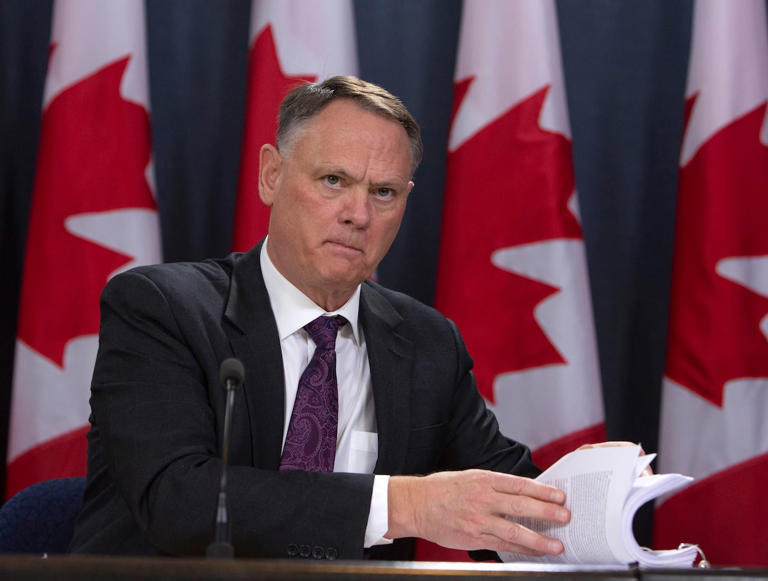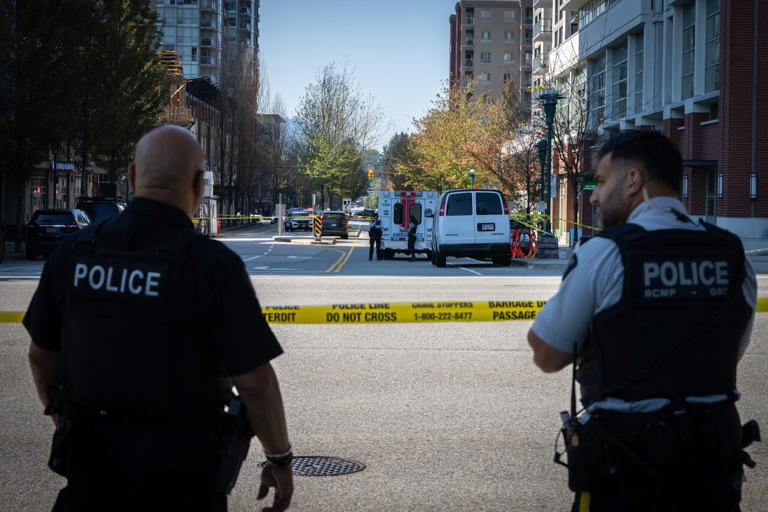Story by Catharine Tunney •
The federal government urgently needs to change how the RCMP's federal policing wing functions or risk seeing national security files fall through the cracks, says a special intelligence and security committee.
"National security is at risk. The security of Canadians is at risk." said Liberal MP David McGuinty, chair of the National Security and Intelligence Committee of Parliamentarians.
"What's at risk is missing something."
The committee, often referred to as NSICOP, tabled a report Tuesday examining the RCMP's federal mandate, which includes foreign interference, violent extremism and terrorism, organized crime and financial crime.
The committee concluded that federal policing is not "as effective, efficient, flexible or accountable as it needs to be to protect Canada and Canadians from the most significant national security and criminal threats."
NSICOP's 91-page report says the RCMP's federal mandate is hindered by a number of resource issues, including the force's focus on boots-on-the-ground policing. The RCMP is under contract as the provincial police service in most provinces. It's also the police force in150 municipalities, all three territories and more than 600 Indigenous communities.
The special committee said the dual mandate creates "undesirable effects."
"We're certainly calling on the federal government to to examine the relationship between contract policing and federal policing inside the organization," said McGuinty
Training outdated, recruits scarce
The committee, made up of MPs from the four recognized parties and senators, found that while federal policing resources may be used to support contract policing, resources seldom flow the other way.
In their report, they blame the situation in part on "weak governance."
NSICOP found that, for example, the RCMP's federal policing side doesn't always have a say in setting national policing priorities.
"Divisions retain significant discretion in the federal policing prioritization process, undermining the ability of the federal policing program to track ongoing investigations and expenditures, or to redirect resources to higher priorities," said the report.
The RCMP's federal policing side is also losing members to contract policing, the report shows.
According to the report, federal policing has lost 600 regular members over the past nine years and was operating with a 13 per cent vacancy rate among regular members in the 2022-23 fiscal year.

David McGuinty, chair of the National Security and Intelligence Committee of Parliamentarians, holds a news conference on March 12, 2020.
Part of the problem, says the report, is that the RCMP's contract obligations take priority when personnel gaps must be filled. The force has only recently pivoted to recruiting directly into federal policing.
Those recruits who do join federal policing may start out on the back foot.
"As of 2021, all federal policing training for investigations, intelligence and covert operations was outdated, with programs failing to keep pace with new criminal threats, recommendations from audits and reviews, or changing legislation," said the report.
The report goes on to say the RCMP has only been able to sustain a federal policing division on such a modest budget — about $959 million of the force's $6 billion budget — because the division is losing officers.
"I dub it as managing by attrition," said McGuinty. "The funds associated with these vacancies have been used to maintain investigations and activities in the federal policing mandate. They're robbing Peter to pay Paul."
Data practices 'disturbing,' says NSICOP chair
In an interview with CBC News, McGuinty called the way data is handled within the RCMP "disturbing."
The committee said the RCMP lacks standardized methods for data management, meaning its information often includes incomplete records, outdated reporting, inconsistencies, incorrect data and missing information.
"The data systems don't support evidence-based decision making," said McGuinty. "So that's a very, very big surprise.
NSICOP made five recommendations, including a call for more resources and amendments to the RCMP Act.
The first recommendation on its list is for the minister of public safety to provide clear and regular direction to the RCMP to strengthen federal policing. The report says that should include direction on governance, financial controls, human resources, recruiting and training, and information management.
McGuinty said the RCMP's problems need to be a "high priority" for the federal government.

The NSICOP report found that while federal resources may be used in support of the contract mandate, the opposite isn't always true.
"What we've found in looking under the hood is a series of issues that have just simply convinced us that we've got to up our game very, very quickly on this. The minister has got to take responsibility," he said.
"I would lay a lot of the responsibility now at the feet of the the minister of public safety, who's got to step up and work."
A spokesperson for Public Safety Minister Dominic LeBlanc said he was not not available to comment.
Look at police independence: NSICOP
The report also recommends the government consider codifying police independence into the RCMP Act.
A federal minister is not allowed to interfere in investigations, but they can issue direction to the RCMP — a word that has caused confusion and scandal in the past.
Former RCMP commissioner Brenda Lucki was accused of meddling in the 2020 mass shooting probe in Nova Scotia by pushing investigators to go public with the weapons the gunman used at the request of the Liberal government. She and then-minister of Emergency Preparedness Bill Blair denied the accusation.
"You can have a specific beginning, middle and end role for a minister to tell the RCMP what to do without having the ministers step onto operational soil," said McGuinty.
The report notes that while the RCMP has initiated reforms to address deficiencies in federal policing, "most are still in their infancy and could easily be hollowed out by a tendency towards the status quo."
In an emailed statement, the RCMP said it welcomes NSICOP's report.
"The need for the RCMP to be equipped and able to deliver on its mandate is more critical than ever," said spokesperson Robin Percival.
"Federal policing is undergoing transformational changes that leverage and build upon past work to ensure it is a modern, sustainable and world-class policing entity, prepared to meet current and future federal law enforcement challenges head on."
NSICOP said it decided to review the RCMP's federal work in February 2021 to get a baseline understanding of the Mounties' mandates and capabilities.
Since then, the public inquiry investigating the one of worst mass shootings in Canadian history released its damning final report. The Mass Casualty Commission, which investigated the April 2020 massacre in Nova Scotia that killed 22 people, called on the public safety minister to review and restructure the RCMP.
NSICOP was created in 2017 with a mandate to review national security measures. Committee members are given top security clearances to permit them to review classified materials and are sworn to secrecy.
No comments:
Post a Comment